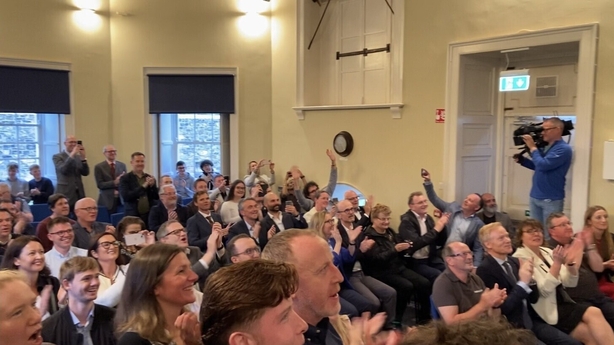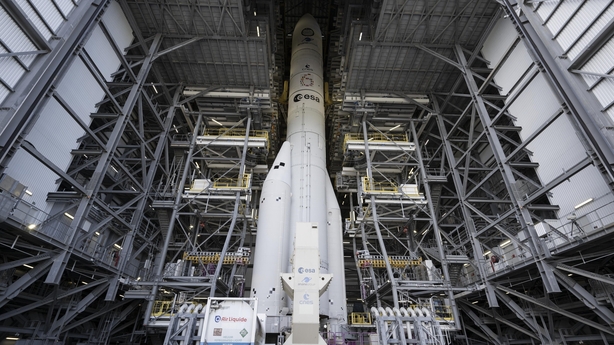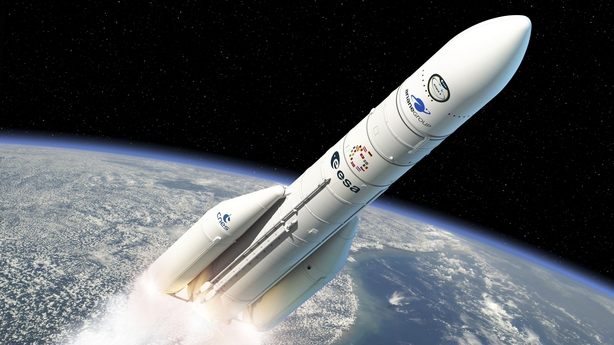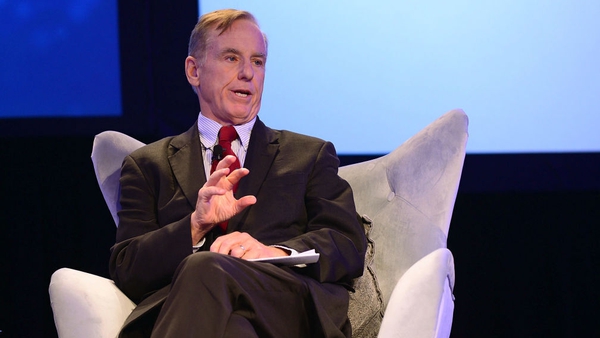A new ESA rocket using Irish-designed technology has been launched into space, in a mission deemed a success, although it ended with the launcher coasting in orbit without releasing its final batch of payloads.
The Ariane 6 is using two technology systems designed and built by Irish space engineering company Réaltra.
Réaltra, meaning 'galaxy' in Irish, created a video recording and transmission system which will provide live HD images during the mission.
Ariane 6 was launched smoothly at 8pm at Europe's Spaceport in French Guiana.
Crews on the ground at the launch site, which is surrounded by jungle on the South American coast, applauded as the rocket soared into clear skies.
Even louder applause came a little over an hour after lift-off when the rocket successfully delivered microsatellites into orbit.
Although not a commercial mission, the flight deployed three sets of micro-satellites for research purposes, prompting European space officials to declare the maiden trip a success.
"Europe is back in space," Philippe Baptiste, head of France's CNES space agency, said via video link to the Paris headquarters of the European Space Agency (ESA), where employees and politicians cheered the lift-off.
In a keenly awaited milestone, the Vinci engine powering the rocket's upper stage was restarted in space for the first time. It is designed to restart repeatedly, allowing operator Arianespace to place payloads into several different orbits.
However, a third firing had to be abandoned after a smaller power unit shut itself down for unspecified reasons, meaning the final batch of payloads - two small capsules designed to test the conditions for surviving re-entry - remained stuck onboard.
"We had an anomaly...We are probably not going to finish this part of the mission as we were hoping to," said Tina Buchner da Costa, an Ariane 6 launch system architect.
The affected auxiliary power unit is a system crucial for the rocket's ability to put payloads in their intended orbit.
Its failure, although late in the mission, is expected to spur an engineering investigation.
ESA Director General Josef Aschbacher said the agency was nonetheless on track to stage a second flight by year-end.
'Absolutely fantastic'
There were jubilant scenes at the Dunsink Observatory in Dublin where members of the Irish space sector had gathered to watch the maiden flight of Ariane 6.
The Chief Commercial Officer of Réaltra Space Systems Engineering, which designed and built the onboard camera and satellite navigation systems described the launch as "absolutely fantastic."
Daniel Gleeson said it was a "beautiful launch and a wonderful experience" and he said it was a fantastic moment for Réaltra, for Ireland, for Europe and for the Ariane group.
"I'm absolutely delighted and well done to the team for delivering this."

Mr Gleeson said the six cameras the company designed onboard the rocket could be seen delivering "perfect images."
He described waiting for and watching the launch as "absolutely incredible" and he said he was very much relieved.
"I had slight indigestion to before the flight but now I’m perfect. It was a wonderful, lovely experience. Really, really brilliant," he added.
We have lift-off! The scene in Dublin at the Dunsink Observatory as Europe's new Ariane 6 space rocket launches from French Guiana. Huge delight here among the team from Réaltra Space Systems Engineering, who designed & built some of the key technology on board #Ariane6 @RTENews pic.twitter.com/QSxvVHPzek
— Fergal O'Brien (@FergalOBrien_) July 9, 2024
Ireland's national delegate to the European Space Agency also described the launch as "fantastic".
Dr Padraig Doolan said "we are feeling absolutely thrilled" in the Dublin Institute for Advanced Studies.
"When the rocket technology engine ignited, it leapt forward into the sky. There was a huge cheer here. Everyone was just thrilled to see the video footage coming through, the separation of the boosters and to see it progressing as it is."
"We are over the moon here," he added.

Dr Doolan, who works with Enterprise Ireland assisting Irish companies to get involved in the space sector, said there was a huge sense of relief with the successful lift-off.
"People forget, space is very hard and getting rockets off the ground safely into orbit is possibly one of the most difficult parts."
"The fact that it worked and worked on schedule and is delivering already, it's a huge relief and a huge cause for celebration for everybody here."
He said the role of Irish companies in the venture was "absolutely massive."
"We're all about bringing in new companies, growing their revenues, getting them into the space supply chain, so it's massive for us absolutely massive that we have Irish companies and Irish technology on board what is really one of Europe's most ambitious projects ever."
'Historic day' for Europe - ESA chief
Liftoff, #Ariane6!
— Bill Nelson (@SenBillNelson) July 9, 2024
What a giant leap forward for @ESA with the first launch of its powerful, next-generation rocket—and with a @NASASun scientific instrument onboard.
Together with our international partners, we are leading a new era of space exploration. https://t.co/5IIvCyExtE
Ariane 6's first launch, which was originally planned for 2020, is hoped to bring an end to a difficult time for European space efforts.
It is hoped that the rocket will be used for a wide range of space missions over the next decade and be another step towards European independence in space research.

It aims to launch several satellites, deployers and experiments from space agencies, companies, research institutes and universities.
The ESA said that "as the world’s second-largest economy, Europe must ensure it has secure and autonomous access to space, so it does not depend on the capabilities and priorities of other nations".
"In a world where everyday life - from connectivity to navigation, climate and weather - relies on space, the ability to launch independently is more important than ever before," it added.
A total of 13 countries, including Ireland, were involved in the project.
We need your consent to load this rte-player contentWe use rte-player to manage extra content that can set cookies on your device and collect data about your activity. Please review their details and accept them to load the content.Manage Preferences
The flight was carrying a payload of university microsatellites, various experiments and two atmospheric re-entry capsules.
Historically, nearly half of the first launches of new rockets have ended in failure. That includes Ariane 5, which exploded moments after lift-off in 1996.
But out of 117 launches over nearly 20 years, only one other Ariane 5 flight completely failed.
On the other side of the world, thousands of people in the French city of Toulouse watched the lift-off on a big screen while sitting on a lawn at the Cite de l'Espace museum.
Additional reporting Fergal O'Brien, Reuters




